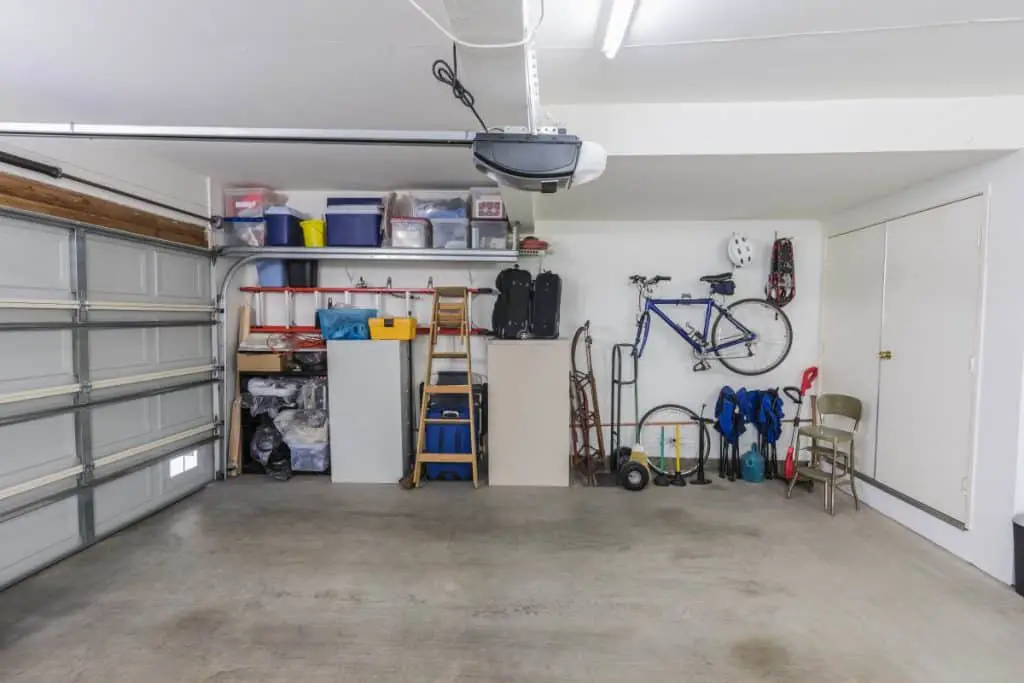You’re pouring a new concrete floor for your garage. You want to get the thickness right the first time since even without ever having to replace it, your floor will be pretty expensive.
The optimal thickness for a concrete garage or driveway is about 6 inches. This thickness should support most mid-sized vehicles and even some heavier ones. However, some garages may need only 4 inches of concrete while others may need up to 9 inches depending on the weight they will be carrying.
So how do you determine the amount of concrete that you’ll need for your garage? Here are the most important factors when considering the floor thickness for your garage.

Table of Contents
What Will The Garage Be Used For?
Concrete is a very strong substance, but it still has its limits. For instance, sustained pressure over long periods of time can cause damage to any concrete floor if it’s not thick enough.
Not pouring enough concrete for a project can lead to a lot of heartache and financial costs down the line.
This being said, not all garages are used for the same things, and what you use your garage for can be extremely important when deciding how much concrete you’ll need for your project.
For instance, If your garage is mostly going to be used as storage for household appliances like vacuum cleaners or washing machines, you probably won’t need more than four inches of concrete.
On the other hand, if you’re pouring a commercial garage that will be holding multiple large trucks or vans, you’ll probably want at least nine inches of concrete.
Related article: When Do You Need to Add Rebar to Concrete for Extra Strength?
What Type Of Vehicles Will You Store In The Garage?
Different vehicles have different weights, obviously. But when it comes to garage floors, the difference between two different vehicles can be a lot more important than you might expect.
While a small car or a motorcycle is unlikely to damage even the least sturdy floors, larger vehicles like pickup trucks or RVs are too heavy for floors that are less than 6 inches thick.

For these heavier vehicles, you’ll want to do whatever you can to make sure your floor is thick enough, especially considering that if it isn’t, it will be sustaining serious damage all the time.
How Big Is Your Garage Going To Be?
This is an important thing to keep in mind as you are planning out your pour for multiple reasons
- The size of your garage will determine the maximum amount of stuff that can be put in it.
- The area of the floor will determine the number of expansion joints you need to put in to control cracking. (What are concrete expansion joints?)
- Small garages are more likely to only fit one car.
The size of the garage won’t be the determining factor in how thick your floor needs to be. However, it will determine each of these other points that are likely to influence your decision.
What’s Your Budget?
Two extra inches of concrete may not seem like a lot, but in reality, it can represent several tons of material.
The difference in cost between a four-inch floor and a six-inch floor can be a lot more than you’re expecting.
Read more: Concrete Pricing Guide: All the Facts and Figures
That being said, skimping on concrete now can lead to needing more expensive projects down the line. Replacing or repairing the floor will probably cost more money than putting it in did.
If you’re looking for a way to save money and you’re not planning on using this garage to hold too much weight, you may want to go with a slightly less thick floor. However, if you need to use this space for big vehicles the extra investment will absolutely be worth it.
When Do You Need To Use This Garage?
Using a little bit less concrete will lead to a slightly shorter curing process. If for some reason your priority for this slab of concrete is that it be immediately usable, this may be something you want to consider.
Fortunately, even a thicker pour won’t take longer than a week to be finished enough for vehicles to drive on it.
Of course, parking far away from your home can be inconvenient and a little scary sometimes, but it’s probably not worth it to try and speed up the curing process by using less concrete.
How Long Do You Need This Floor to Last?
One of the biggest reasons that concrete driveways and garage floors need to be replaced is that they weren’t thick enough.
Generally speaking, thicker slabs of concrete will almost always be more resilient, so if you want to put off replacing this floor for as long as possible one way to do it is to pour as thick as you can afford.
Thicker floors are more likely to have a strong structure to support whatever you need to put on top of them. They tend to take less damage over time, especially from frequent use.
That doesn’t necessarily mean that every garage needs an eleven inch floor.
For most projects, six inches will still be plenty to last for pretty much as long as you need it. There is a degree of diminishing returns here, so if you don’t need to pour more than six inches just don’t.
Where Are Your Doors?
This is really only something you need to take into account if you’re pouring in a garage that’s already finished enough to have doors. If your floors are too thick, you might block the door into your garage from your house making it impossible to open.
This is an undesirable position to be in since it can be a huge hassle to move a doorway even a little bit. It’s much easier to plan ahead so that you don’t need to fix any of your doors.
Are You Paving Over An Old Layer Of Concrete?
If you’re planning to pour your new concrete over the old concrete floor there’s a lot you need to think about before you even start.
You won’t need to pour quite as much concrete as you usually would. Assuming that your old floor is still structurally stable, you should be able to get away with only two or three inches of concrete over the top of it.
The old floor will be helping a lot to hold up your vehicles, meaning that it won’t really be necessary for you to prepare a whole new floor.
What Do The Experts Say?

Most experts seem to agree that six inches is the optimal thickness for driveways and garage floors.
It will be enough to hold up the vast majority of vehicles including pickup trucks and RVs. Any less will sustain damage easily, and any more would be superfluous for the vast majority of people. I think that this is one place where we can certainly trust the expert opinion.
Whether you’re hiring a contractor or pouring the concrete slab yourself, a long lasting and structurally sound concrete floor is within reach of anyone as long as you’ve done the proper preparations.
Plan ahead! Planning will make every part of this process easier.



